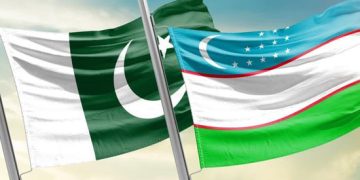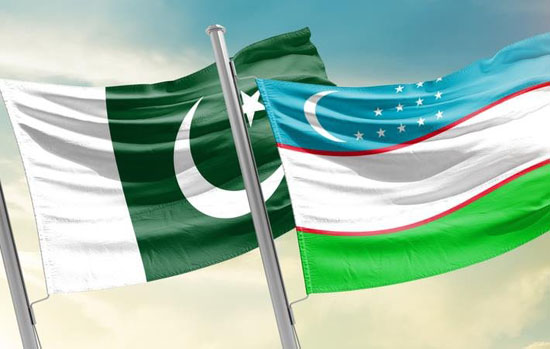 Pakistan was among the first countries to establish diplomatic relations with Uzbekistan upon its independence in 1991. Since then, both the governments continuously strengthened and improved this relationship. Both the countries enjoy very friendly relations based on their common religious and cultural heritage, besides geographic proximity as well. Besides being members of the United Nations (UN), the Organization of the Islamic Countries (OIC), and Economic Cooperation Organization (ECO), Pakistan and Uzbekistan are also members of Shanghai Cooperation Organization (SCO). Uzbekistan is one of the founder members of the Organization whereas Pakistan became SCO member in 2017.
Pakistan was among the first countries to establish diplomatic relations with Uzbekistan upon its independence in 1991. Since then, both the governments continuously strengthened and improved this relationship. Both the countries enjoy very friendly relations based on their common religious and cultural heritage, besides geographic proximity as well. Besides being members of the United Nations (UN), the Organization of the Islamic Countries (OIC), and Economic Cooperation Organization (ECO), Pakistan and Uzbekistan are also members of Shanghai Cooperation Organization (SCO). Uzbekistan is one of the founder members of the Organization whereas Pakistan became SCO member in 2017.
Heading a high-level official delegation and accompanied by more than 100 leading businessmen, former Prime Minister of Pakistan, Imran Khan, visited Uzbekistan, in July 2021. He participated in Uzbekistan – Pakistan Business Forum and addressed the international trade conference as well. Many important Memorandums of Understanding (MoU), including ‘Transit Trade Agreement’ and ‘Simplification of Visa procedures’ were signed during this visit.
Uzbek President, H.E. Shavkat Mirziyoyev also visited Pakistan in March 2022. He held wide ranging talks with Pakistani leadership on strengthening bilateral relations. A ‘Joint Declaration on the ‘Establishment of Strategic Partnership’, between both countries, signed during the visit, emphasized significance of increased cooperation in the areas of commerce and trade with special reference to Uzbekistan’s transit trade with rest of the world through Pakistan. President Mirziyoyev also underscored the importance of regional connectivity and significance of integration and connecting Uzbekistan and Central Asian countries to the world markets through Pakistan’s seaports at Arabian Sea. Development of a deep sea port at Gawadr, in southern Pakistan, as a flagship projects of China Pakistan Economic Corridor (CPEC) can play an important role for this purpose. In addition, there is great scope for mutual cooperation between Pakistan-Uzbekistan and SCO, with particular reference to sustainable development. Pakistan and Uzbekistan are committed to the UN Sustainable Development Goals (SDGs).
Republic of Uzbekistan took over the rotating SCO Presidency following the SCO Heads of State Council meeting held in Dushanbe in 2021. The SCO was founded by six members; China, Kazakhstan, Kyrgyzstan, Russia, Tajikistan and Uzbekistan. Indian and Pakistan became its members in 2017. With Iran being becoming a full member in 2021, currently SCO comprises nine Member States. In addition, it has three States; Afghanistan, Belarus, and Mongolia, having Observer status and are interested in seeking full membership. Moreover, there are nine ‘Dialogue Partners’; Armenia, Azerbaijan, Cambodia, Egypt, Nepal, Qatar, Saudi Arabia, Sri Lanka and Turkey. Egypt, Qatar, and Saudi Arabia have joined this group in 2021.
The SCO’s main goals include:
Strengthening mutual trust and neighbourliness among the member states;
Promoting their effective cooperation in politics, trade, the economy, research, technology and culture, as well as in education, energy, transport, tourism, environmental protection, and other areas;
Making joint efforts to maintain and ensure peace, security and stability in the region; and
Moving towards the establishment of a democratic, fair and rational new international political and economic order.
The Heads of State Council (HSC) is the supreme decision-making body of the SCO. There is also an elaborate mechanism of cooperative engagement at various level. The SCO is a multi-role Organisation. Economic cooperation and development is among its priority goals. For this purpose, the SCO has worked on a variety of initiatives. In September 2003, a 20-year Programme of Multilateral Trade and Economic Cooperation was signed. As a long-term goal, the programme provides for the establishment of a free trade zones within the territory under the SCO member states. In the short run, SCO seeks to reinvigorate the process of creating favourable environment for promoting trade, commerce and investment.Though SCO has not played and assertive and effective role in maintain or restoring international peace and security, this aspects is very much part of the SCO charter. In this context, it is expected that the SCO will play its rightful due role for conflict resolution and reconciliation of regional and intra-regional disputes through mediation and facilitated negotiations.
With the above-mentioned broad objectives of the SCO, Pakistan and Uzbekistan can jointly benefit from emerging possibilities and prospects of intra-SCO cooperation in the fields of commerce and trade to achieve sustainable development. Some suggestions to facilitate Pakistan – Uzbekistan economic cooperation with other SCO member states to achieve sustainable development are as follow:
-Ancient Silk Roads spirit and a network of regional connectivity must be revived between Central and South Asia, incorporating all SCO members.
-Focus be laid on increasing bilateral and multi-lateral commerce and trade by improving Business to Business (B2B) relations and cooperation among Chambers of Commerce and Trade of all SCO member states.
-People to People (P2P) connectivity be facilitated, taking advantage of religious and cultural affiliation between both nations and among SCO members as well.
-In order to offset the disadvantages confronted by Uzbekistan as a landlocked country, and to take advantage of its strategic position in Central Asia, Pakistan Uzbekistan Trans-Afghan Railway Line Project, connecting Termez to Peshawar, through Mazar-i-Sharif and Kabul in Afghanistan, should be included in BRI as priority. It would provide access from Uzbekistan and other SCO members of Central Asia to Middle East, Far East, Africa, and Europe through Pakistani ports located at Arabian Sea / Indian Ocean.
-A collaborative joint venture by Pakistan, Uzbekistan and Iran, incorporating Pakistani and Iranian ports at Arabian Sea / Indian Ocean, under SCO frameworks, can accrue enormous advantages to all SCO member states.
-Special Economic Zones (SEZs) and Special Technology Zones (STZs) have been planned all along CPEC. Special concessions and incentives should be offered to Uzbek businessmen / investors and other investors from SCO member states to take advantage of this unique opportunity.
-Uzbekistan, having enormous natural resources, needs commercial opening to the world. Pakistan can act as a genuinely natural bridge between Uzbekistan and the rest of the world.
-Pakistan and Uzbekistan should finalize Free Trade Agreement without any delay. In fact, SCO members need to establish an Economic Union by declaring the SCO Region as a Free Trade Zone.
-Pakistan and Uzbekistan should undertake joint economic development projects with necessary help and guidance from the SCO Development Bank. Pakistan, Uzbekistan, Iran, and Turkey can also pursue joint projects under combined efforts of ECO and SCO.
-All SCO members should relax their Visa Policy to include 90 Days Visa on arrival, especially for members of Chambers of Commerce and Trade, academia, student tourists and journalists.
-Pakistan and Uzbekistan must cooperate and support other SCO members in their counter terrorism efforts, especially to promote peace, stability, reconciliation, reconstruction and economic progress in Afghanistan. Without peace in Afghanistan, no collective vision of sustainable socio-economic development can be materialized in SCO region.
-The SCO should play more assertive role in Conflict Resolution in the region, especially in South and Central Asia.
Strong diplomatic and economic relations between Pakistan and Uzbekistan and multilateral relations among all members of SCO can lead to political stability, economic progress and sustainable development to transform the geo-economic dynamics of the SCO region. Such mutual cooperation and traditional Asian and Silk Road spirit will open new vistas of multifaceted social and economic progress among all members of States and will promote peace and security in the region as well.
(Writer is a former High Commissioner of Pakistan to Sri Lanka and founding member of CSAIA Islamabad. The article is based on his speech delivered at a Webinar on ‘Mutual Cooperation between Pakistan-Uzbekistan and SCO for Achieving the Sustainable Development.




